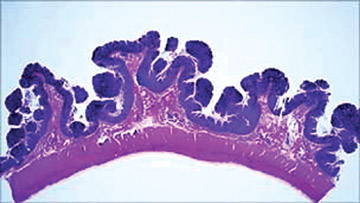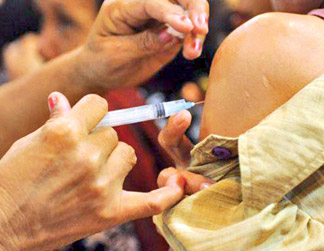|
Health Watch
In the name of fairness!
Nadira GUNATILLEKE
Health Ministry sources revealed some interesting facts in connection
with fairness creams recently. It is worth publishing those facts for
the use of general public. Keep reading. I wish that you will not be
among the people who we are going to talk about today.
According to the Health Ministry sources there are a large number of
fairness creams and skin whitening creams in the market. Non of them had
been registered with the National Drug and Cosmetic Devices Control
Authority and non of them have manufacture of expiry dates printed on
them. The worst part is nobody knows the content/ingredients in such
products.
Here comes the real situation of our own society. According to the
same sources it is men than women who use fairness creams to become
fairer. Women are also using fairness creams in a large scale. Most of
such products come into the market through persons who go abroad. They
sell the products to a local shop after returning to the country. Then
the products reach innocent men and women who are dying to get fairer
skin.
The sources said that a significant number of men and women visit
both state and private hospitals daily seeking treatment for various
skin, head and eye complications caused by those fairness creams and
other skin whitening products. Various hair dyes are also among such
cosmetic devices. The persons visit hospitals with damaged skin, eye
complications, hair fall, burnt / wounded lips etc. Some complications
can be reversed and some cannot.
The poor people pay the price for trying to be pretty and fair.
According to the present law, all cosmetic devices such as fairness
creams, lipstics, hair dye and similar items should register in the
National Drug and Cosmetic Devices Control Authority. This registration
made compulsory by the Health Ministry last week. The main objective of
this move is setting up standards in the cosmetic devices available in
the market. At the moment there is no standard in any cosmetic device
available in the market. But the ignorant public buy them crazily
because all what they want is to become fairer and pretty than a beauty
queen.
We proudly say that our literacy rate is over 90 per cent and our
society is highly educated and aware of health and nutrition. But
unfortunately the same population any type of fairness cream without
thinking twice. They never check what is inside the product or the
impact of the ingredients of the product. All what they need is to
become a fair person within the shortest time. No matter if they fall
sick or even loose life.
This is the mentality of the majority of people who buy fairness
creams. Nothing or no one can stop them becoming fair. They do not know
or ignore the fact that having a black skin is safer (healthier) than
having a white skin. Their brain is full of the myth that fair is
beautiful and dark is ugly. But the top model of the whole world is a
black woman.
It was all about fairness creams. How about other cosmetic devises
such as capsules and tablets that give you fairness ? There are many
such products in the market. People by them like food stuff and swallow
without thinking twice. We hear about their impact only when a patient
turn up in a state hospital seeking treatment for a disease caused by
such products. There is a big difference in a product that freely
available in the open market and a product that prescribed by a doctor
after carefully examining your condition. This applies to products such
as creams and shampoos. But ignorant persons do not see any importance
in this. They consult a beautician (not a dermatologist) to get a
solution for their skin diseases.
What is important to you? Is it being healthy or being fair? Please
do not sacrifice your health to become fairer. You have to live and only
then you can think about becoming fair. I read something in a foreign
(British) medical journal which is very true. If you think you are
pretty and fair the people see you as a pretty and fair person. If you
think otherwise the people see you as an ugly person. That is the
reality which does not accept by the majority of persons who always
depend on the judgments given by others. It is all right to do it when
it comes to other things but not your health!
Genetic test reduces Prostate surgeries
Drucilla Dyess
The development of a genetic screening test could lead to the
prevention of unnecessary prostate cancer surgeries. The discovery of a
genetic pattern that may predict the aggressiveness of the disease could
save countless men from undergoing life changing surgery. Details of the
new research were recently published in the Lancet Oncology journal.
Although many prostate tumors are very slow growing and deemed
relatively harmless, others are gravely aggressive and require immediate
treatment. Determining whether or not tumors are life-threatening has
remained a major obstacle for doctors. This has lead many men to undergo
surgery, erring on the side of caution, only to suffer serious side
effects such as impotence and incontinence. But now, a group of British
researchers at Queen Mary, University of London, have discovered that
those men having the highest levels of the genes that promote cell
growth, known as cell cycle progression (CCP), are at the greatest risk
of having the deadliest form of prostate cancer. In addition, findings
indicated that among patients having already undergone surgery for
removal of their prostate, those having the highest CCP levels were 70
percent greater risk of experiencing a recurrence of the disease. The
study involved 703 men with prostate cancer. Among them were 366 men in
America who had undergone surgery for the removal the prostate, and 337
men in Britain having cancer that was confined to the prostate who were
deemed not to be in need of immediate treatment.
The researchers tested tissue samples taken from the men either
during surgery, or from their diagnostic biopsy, for levels of 31
different genes involved in CCP. Findings showed that a specific
combination of the gene levels can be used to identify whether men are
at a high or low risk of their cancer spreading beyond the prostate.
According to researcher Jack Cuzick, a cancer specialist based at
Queen Mary, “Our findings have great potential.” He went on to explain,
“CCP genes are expressed at higher levels in actively growing cells, so
we could be indirectly measuring the growth rate and inherent
aggressiveness of the tumour through a test.” Cuzick also pointed out
that previous studies have already indicated the ability of CCP levels
to predict survival for people having breast, brain and lung cancers. US
- based Myriad Genetics has already developed a test called Prolaris to
measures CCP levels. According to Cuzick, if further research confirms
the findings of the latest study, the test could be available for use in
prostate cancer patients within about a year.
–Healthnews
Exercise cuts risk of developing cancer polyps
People who lead an active lifestyle are up to a third less likely to
develop polyps which can develop into bowel cancer, according to a
study.
The report pulls together 20 previous studies looking at the link
between exercise and the development of large polyps.
Bowel cancer is the third most common cancer in the UK.
More than 38,000 people are diagnosed with the disease each year.
The work was done by scientists from the Washington University School
of Medicine in St Louis in the US.
|

Regular exercise reduces the risk of developing polyps which can
lead to bowel cancer |
Publishing their findings in the British Journal of Cancer, they say
they have produced the most accurate figures yet that show low exercise
levels are linked to bowel polyps.
They found that people who take regular exercise were 16% less likely
to develop bowel polyps and 35% less likely to develop large or advanced
polyps. The reality is that exercise is acting through more than one
mechanism. The upside is there are so many benefits all over the body,
it is hard to pinpoint” Professor Kathleen Wolin Washington University
School of Medicine Polyps - also known as adenomas - are growths in the
bowel and while they are not cancerous in themselves they can develop
into cancer over a long period of time. Cancer Research UK says most
bowel cancers develop from a polyp and about 1 in 4 of us have one or
more by the age of 50, while about half of us have them by the time we
are 70. But only a small fraction of polyps develop into cancer and it
takes years for that to happen.
Professor Kathleen Wolin, one of the lead authors of the research,
says the evidence now shows a clear link between exercise and a reduced
risk of bowel cancer but it is not yet clear exactly why that link
exists.
“There are a number of likely pathways but we don’t know exactly. So
for example exercise reduces inflammation in the bowel, which has been
linked to bowel cancer. “But exercise also reduces insulin levels and
improves the body’s response to hyperinsulinaemia (excess levels of
insulin circulating in the blood), which again increases polyp risk. “It
also enhances the immune system and because people who exercise often do
so outside, they get vitamin D, which is also important for bowel
cancer.
“The reality is that exercise is acting through more than one
mechanism. The upside is there are so many benefits all over the body,
it is hard to pinpoint.” Keeping active Sara Hiom, director of health
information at Cancer Research UK, says the evidence shows that keeping
active could help prevent thousands of cases of cancer every year.
“We’d recommend doing at least half an hour’s moderate exercise a day
- such as brisk walking or anything that leaves you slightly out of
breath. Getting enough physical activity will also help you keep a
healthy weight, which is one of the most important ways of reducing the
risk of cancer.” Mark Flannagan, Chief Executive of Beating Bowel
Cancer, backed the study and said it was clear that lifestyle was an
important factor in protecting yourself from cancer.
“Although the majority of polyps are not cancerous, it is thought
that almost all bowel cancers develop from polyps. Therefore we
recommend taking 30 minutes of physical activity each day, along with a
healthy diet and lifestyle, to reduce your risk of developing bowel
cancer.” Deborah Alsina, Chief Executive of Bowel Cancer UK, said the
report was good news. “Evidence also shows that the combination of
taking more exercise and having a healthy diet may protect against bowel
cancer, as well as weight gain and obesity, so we encourage people to do
both. “It is also important that people take part in the screening
programme, if eligible, as screening is an effective means of detecting
polyps at an early stage. These polyps can easily be removed, reducing
the risk of bowel cancer developing.”
BBC
Gene swapping by flu viruses
N Gopal Raj
AFP More Virulent: If H1N1 virus swaps genes with a bird flu, the
progeny can be more virulent than the two parental strains.
The H1N1 flu virus that set off the 2009 pandemic could create yet
more trouble. Research from a Chinese group has indicated that if this
virus were to swap genes with a bird flu virus circulating in poultry,
it can produce progeny that easily infect laboratory mice and are more
virulent than the two parental strains.
When two strains of bird flu infect the same host, they can readily
swap genes, a process known as reassortment. The 2009 H1N1 pandemic
virus was itself a triple reassortant, with its genes drawn from bird,
human and animal strains.
This mix of genes created a virus that readily infected humans, was
easily transmitted from one person to another, and to which most people
had no immunity. The preceding three flu pandemics that occurred during
the 20th century were also produced by viruses that had undergone
reassortment.

In research being published this week in the journal Proceedings of
the National Academy of Sciences (PNAS), a team of scientists led by
Jinhua Liu of the China Agricultural University in Beijing used
laboratory techniques to create viruses with various combinations of
genes drawn from the avian H9N2 virus and the pandemic H1N1.
Some 73 different reassortant viruses that replicated well in
cultured cells were then tested on mice. Eight of those viruses were
found to be more virulent than either of the parental strains, producing
severe pneumonia in the animals.
The worry is that such reassortment could take place in pigs, which
have long been considered a ‘mixing vessel’ as they can be infected by
human as well as bird flu viruses.
The H1N1 virus that caused the 2009 pandemic seems to have undergone
reassortment in pigs before making the leap to humans. The viruses that
caused the previous three pandemics too appear to have been in some
mammalian host, which may well have been the pig, before causing disease
in humans.
There is already evidence that the 2009 H1N1 pandemic virus is
infecting pigs and swapping genes with other flu viruses.
In a paper published in the journal Science last year, Vijaykrishna
Dhanasekaran and others reported a novel reassortant virus that had been
isolated from pigs in an abattoir in Hong Kong in January 2010. The
reassortant virus combined genes from the H1N1 pandemic virus and a H1N2
virus. Swine infected with the new virus showed only mild illness. It
was not yet possible to predict what subtype of the flu virus would
cause the next pandemic, said Dr. Vijaykrishna in an email.
Although more attention was paid to the H5N1 bird flu, the latest
PNAS study clearly highlighted the fact that other flu subtypes that
were circulating in poultry had the potential to start future pandemics.
The H9N2 virus, which had become the “underdog of avian influenza
study,” had been detected virtually in every country in Asia. Studies
showed that it had become endemic in poultry in East and South-East Asia
(including China), India, Pakistan and some West Asian countries, he
added.
Sustained transmission of avian viruses in pigs increased the
possibility of mammalian adaptation, thereby increasing the risk of such
a virus emerging in humans, observed Dr. Vijaykrishna. As such, it was
very important to monitor the flu viruses that were circulating in pigs.
- The Hindu
Want to live longer?
London: An apple a day keeps the doctor away. Now, scientists
claim the fruit may help one live longer - at least among flies.
 Researchers at the Chinese University of Hong Kong found that when
given an apple extract, fruit flies, which share many genes with humans
despite their tiny size, lived 10 percent longer than those fed
normally. The flies with normal diet lived an average of 50 days - five
days fewer than those whose food was supplemented with apple extract,
the Daily Mail reported. Researchers at the Chinese University of Hong Kong found that when
given an apple extract, fruit flies, which share many genes with humans
despite their tiny size, lived 10 percent longer than those fed
normally. The flies with normal diet lived an average of 50 days - five
days fewer than those whose food was supplemented with apple extract,
the Daily Mail reported.
Not only did the flies given the apple extract live 10% longer, they
also found it easier to walk, climb and move about as they aged.
The apple extract also cut levels of various biochemicals found in
older fruit flies and linked to age-related deterioration, the
researchers found. They believe that the antioxidants in the extract
mopped up free radicals, the dangerous chemicals blamed for a host of
ills, including ageing.
“The results, obtained with fruit flies - stand-ins for humans in
hundreds of research projects each year - bolster similar findings on
apple antioxidants in other animal tests,” said a spokesman for the
American Chemical Society.
In another study, researchers who quizzed women about their diets
found that those who regularly ate apples were 20 percent less likely to
suffer heart attacks and strokes.. -The Times of India
Diabetes can reduce lifespan
London: Developing diabetes in middle age may cut your life short by
about six years, a new study has suggested. The study, involving over
250 scientists from 25 countries, was the first such research that
linked reduction of life expectancy to having type two diabetes.
Diabetes is known to double the risk of heart attacks and strokes,
but the new findings showed that people with type 2 diabetes are also at
greater risk of dying from cancer, infection and mental disorders, the
Daily Mail said. Scientists from the Emerging Risk Factors Collaboration
- co-ordinated by the University of Cambridge - analysed data on 820,900
people.
After accounting for other risk factors like age, sex, obesity and
smoking, the researchers found people with diabetes were at increased
risk of death from cancers, infections, mental disorders, liver,
digestive, kidney and lung diseases.
Researcher Naveed Sattar of University of Glasgow said: “The findings
not only show the extensive range of complications linked to diabetes,
but also the importance of raised sugar levels, as opposed to
cholesterol and blood pressure to such complications.”
The Times of India
|



